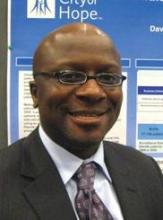Race is a significant predictor of the odds of surviving gastric cancer at the time of diagnosis: Its impact lessens the longer the patient survives, an analysis of data on 24,657 patients who underwent potentially curative surgery suggests.
At the time of diagnosis, estimates of 3-year relative conditional survival rates were significantly different by race. Asian patients (17% of the cohort) had a 3-year relative conditional survival of 52%, compared with 42% for black patients (14% of the cohort), and 41% for white patients (69% of the cohort), Dr. David T. Luyimbazi and his associates reported.
For patients who were still alive 3 years after diagnosis, the estimates that they would survive another 3 years improved in each group, and the racial gap narrowed significantly and nearly disappeared. Three-year relative conditional survival rates were 83% for Asian patients, 82% for black patients, and 78% for white patients, Dr. Luyimbazi said in a poster presentation at a meeting on gastrointestinal cancers sponsored by the American Society of Clinical Oncology.
His study won a Merit Award at the meeting.
The investigators analyzed data from the Surveillance, Epidemiology and End Results (SEER) registry on patients with gastric cancer who were treated with curative surgery from 1988 to 2006.
Conditional survival analyses estimate a patient’s probability of surviving for a specified time given that the patient already has survived a specified time after diagnosis. In patients with gastric cancer, conditional survival estimates rely on disease staging, pathological tumor characteristics, and a variety of clinical factors. These estimates do not typically include the influence of racial disparities, even though previous studies have shown that racial disparities are a predictor of survival, independent of clinical or pathological features, said Dr. Luyimbazi, a surgical oncology fellow at City of Hope National Medical Center, Duarte, Calif.
Conditional survival can be a "confusing concept" but it’s gradually being embraced by oncologists because it makes sense that a patient’s prognosis at the time of diagnosis is not the same after the patient has survived a year or 2 or 3 years longer, he said in an interview.
Eventually, it may be possible to create a nomogram so that physicians can use a particular patient’s characteristics to estimate how much longer the patient might live, given how long the that person has lived since diagnosis, he suggested. A clinician might be able to suggest to a patient who has been followed every 6 months for the last 3 years that follow-up intervals be lengthened or shortened, depending on any change in conditional survival, Dr. Luyimbazi said. And if a patient reaches a point at which the estimated conditional survival is the same as it was before being diagnosed with cancer, the patient might revert to the same surveillance schedules used for the general population.
Conditional survival was reported in the study as a relative conditional survival rate, which is the observed conditional survival rate divided by the expected conditional survival rate from a general population that is matched to the study cohort by age, sex, and race.
One year after diagnosis, the 3-year relative conditional survival rates increased to 64% for Asian patients, 56% for black patients, and 55% for white patients. By 2 years after diagnosis, the 3-year relative conditional survival rates were 76% for Asian patients, 71% for black patients, and 68% for white patients. Rates improved further, and the racial gap narrowed even more, by the third year after diagnosis.
Dr. Luyimbazi reported having no financial disclosures.
On Twitter @sherryboschert


